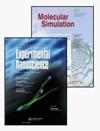Effects of attractive inter-particle interaction on cross-transport coefficient between mass and heat in binary fluids
IF 2
4区 化学
Q4 CHEMISTRY, PHYSICAL
引用次数: 0
Abstract
ABSTRACTIn some binary fluids, mass transport is observed under a temperature gradient. This phenomenon is called the Soret effect. In this study, we discuss the influence of inter-particle interaction. We considered equimolar binary Lennard–Jones fluids with a mass contrast, whereas the interaction was common for all the particle pairs with various cut-off lengths. We performed molecular dynamics simulations of such fluids under equilibrium to obtain the cross-transport coefficients L1q between the fluxes of mass and heat. The simulation revealed that this quantity strongly depends on the cut-off length. Further, we decomposed the heat flux into kinetic and potential contributions and calculated the cross-correlations between decomposed fluxes and the mass flux. The result indicates that the potential contribution dominates L1q, implying that the Soret coefficient is altered by the inter-particle interaction.KEYWORDS: Soret effecttransport coefficientlinear response theorybinary fluidscut-off length AcknowledgmentsThe authors thank Prof. Sasa (Kyoto University) for informing the authors of his work on the derivation of hydrodynamic equations from the Hamiltonian dynamics.Disclosure statementNo potential conflict of interest was reported by the author(s).吸引粒子间相互作用对二元流体中质热交叉输运系数的影响
在某些二元流体中,质量输运是在温度梯度下观察到的。这种现象被称为索莱特效应。在本研究中,我们讨论了粒子间相互作用的影响。我们考虑了具有质量对比的等摩尔双伦纳德-琼斯流体,而相互作用对于具有不同截止长度的所有粒子对都是常见的。在平衡状态下对此类流体进行了分子动力学模拟,得到了质量通量和热量通量之间的交叉输运系数L1q。仿真结果表明,该量与截止长度密切相关。进一步将热通量分解为动力贡献和势贡献,并计算了分解后的热通量与质量通量的相互关系。结果表明,势能贡献在L1q中占主导地位,表明粒子间相互作用改变了Soret系数。关键词:索氏效应输运系数线性响应理论二元流体截止长度作者感谢Sasa教授(京都大学)为作者提供了从哈密顿动力学推导流体动力学方程的工作。披露声明作者未报告潜在的利益冲突。
本文章由计算机程序翻译,如有差异,请以英文原文为准。
求助全文
约1分钟内获得全文
求助全文
来源期刊

Molecular Simulation
化学-物理:原子、分子和化学物理
CiteScore
3.80
自引率
9.50%
发文量
128
审稿时长
3.1 months
期刊介绍:
Molecular Simulation covers all aspects of research related to, or of importance to, molecular modelling and simulation.
Molecular Simulation brings together the most significant papers concerned with applications of simulation methods, and original contributions to the development of simulation methodology from biology, biochemistry, chemistry, engineering, materials science, medicine and physics.
The aim is to provide a forum in which cross fertilization between application areas, methodologies, disciplines, as well as academic and industrial researchers can take place and new developments can be encouraged.
Molecular Simulation is of interest to all researchers using or developing simulation methods based on statistical mechanics/quantum mechanics. This includes molecular dynamics (MD, AIMD), Monte Carlo, ab initio methods related to simulation, multiscale and coarse graining methods.
 求助内容:
求助内容: 应助结果提醒方式:
应助结果提醒方式:


